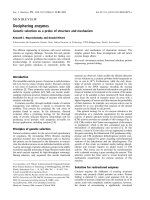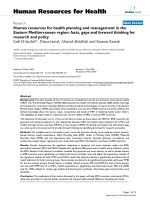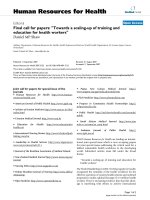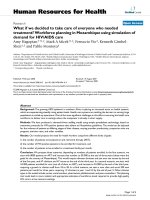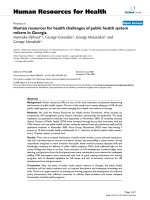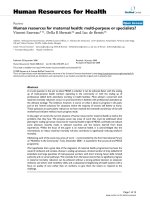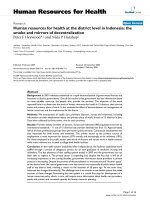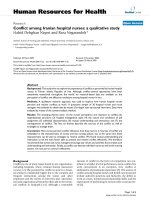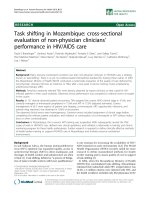báo cáo sinh học:" Final call for papers: "Towards a scaling-up of training and education for health workers" potx
Bạn đang xem bản rút gọn của tài liệu. Xem và tải ngay bản đầy đủ của tài liệu tại đây (183.71 KB, 2 trang )
BioMed Central
Page 1 of 2
(page number not for citation purposes)
Human Resources for Health
Open Access
Editorial
Final call for papers: "Towards a scaling-up of training and
education for health workers"
Daniel MP Shaw
Address: Department of Human Resources for Health, Health Systems and Services, World Health Organization, 20 Avenue Appia, Geneva,
Switzerland
Email: Daniel MP Shaw -
Joint call for papers for special issue of the
journals
• Human Resources for Health an-
resources-health.com
• American Journal of Public Health
• Archives of Iranian Medicine />index.html
• Croatian Medical Journal
• Education for Health cationfor
health.net
• International Nursing Review ckwellpub
lishing.com/inr
• Leadership in Health Services entacon
nect.com/content/mcb/211
• Journal of the Brazilian Association of Medical Schools
• New Zealand Medical Journal />journal
• Nursing Ethics
• Online Brazilian Journal of Nursing />objnursing
• Open Medicine
• Papua New Guinea Medical Journal http://
www.pngimr.org.pg/medicaljournals.htm
• PLoS Medicine
• Progress in Community Health Partnerships http://
pchp.press.jhu.edu
• Public Health />pubh/
• South African Medical Journal r
nals.co.za/sama/m_samj.html
• Sudanese Journal of Public Health http://
www.sjph.net.sd
WHO Human Resources for Health are leading an interna-
tional joint special issue which is now accepting papers
for joint special issues addressing the critical need for a
skilled, sustainable health workforce in the developing
world. Submitted articles must fall under the broad
theme:
"Towards a scaling-up of training and education for
health workers"
The World Health Report 2006: Working together for health,
recognized the centrality of the health workforce for the
effective operation of country health systems and outlined
proposals to tackle a global shortage of 4.3 million health
workers. There is increasing evidence that that this short-
age is interfering with efforts to achieve international
Published: 11 September 2007
Human Resources for Health 2007, 5:22 doi:10.1186/1478-4491-5-22
Received: 31 August 2007
Accepted: 11 September 2007
This article is available from: />© 2007 Shaw; licensee BioMed Central Ltd.
This is an Open Access article distributed under the terms of the Creative Commons Attribution License ( />),
which permits unrestricted use, distribution, and reproduction in any medium, provided the original work is properly cited.
Publish with Bio Med Central and every
scientist can read your work free of charge
"BioMed Central will be the most significant development for
disseminating the results of biomedical research in our lifetime."
Sir Paul Nurse, Cancer Research UK
Your research papers will be:
available free of charge to the entire biomedical community
peer reviewed and published immediately upon acceptance
cited in PubMed and archived on PubMed Central
yours — you keep the copyright
Submit your manuscript here:
/>BioMedcentral
Human Resources for Health 2007, 5:22 />Page 2 of 2
(page number not for citation purposes)
development goals, including those contained in the Mil-
lenium Declaration and those of WHO's priority pro-
grammes.
The health workforce crisis in developing countries
derives principally from inadequate educational opportu-
nities for health workers and a lack of relevance of their
training to community health care practice. Additional
contributing factors include: inadequate compensation
and working conditions, the deteriorating health of the
workforce in many developing countries, urban/rural and
workforce imbalance, and migration of the workforce
from developing to developed countries.
We are seeking manuscripts concerned with the scaling-
up of training and education for health workers. Possi-
ble sub-themes include, but are not limited to:
• private sector engagement
• regulatory frameworks for education and practice
• labour market dynamics after the production of health
workers (e.g. retention)
• training teams rather than individuals
• skills mix
• multi-skilled workers, responsive to exiting needs
• task-shifting/role substitution
• competency-based education and training
Examples of questions that could be considered are:
• What ongoing efforts to increase graduate level primary
care training have been established in developing coun-
tries. What has been their impact and what have been
their problems?
• What effective strategies have been developed and tested
for customizing the workforce skill mix to local health
service needs? For example, what impact have recent
health sector reforms had on the local health workforce?
• What is the status of existing efforts to train health work-
ers using innovative methods, including distance learning
and various forms of information technology? How will
training by protocol differ from, and complement, tradi-
tional community health worker training?
• How can the health professional training be better
aligned with local health needs and be more socially
accountable?
• What is the status of existing collaborations between
developing countries aiming to improve health worker
education?
• How have modifications in healthcare management had
an impact upon health workforce capacity at the local
level?
Papers will be accepted in two formats:
Full papers of 3000 words or less for policy and research
papers
Brief communications of less than 1200 words: better
suited to program or project descriptions or commentar-
ies.
Planned publication will be for a period of several
months, starting from June 2008. There will be an online
facility to respond to published articles in order to accom-
modate a live debate.
If you would like to submit either an article or brief,
please send us a provisional title and a short outline of
the major topics you would address.
Proposals for manuscripts are due by 15 September
2007 and should be submitted by e-mail to hrhspe-
Instructions for submission of articles
will then be provided with feedback. Final manuscripts
are due by 30 November 2007.
